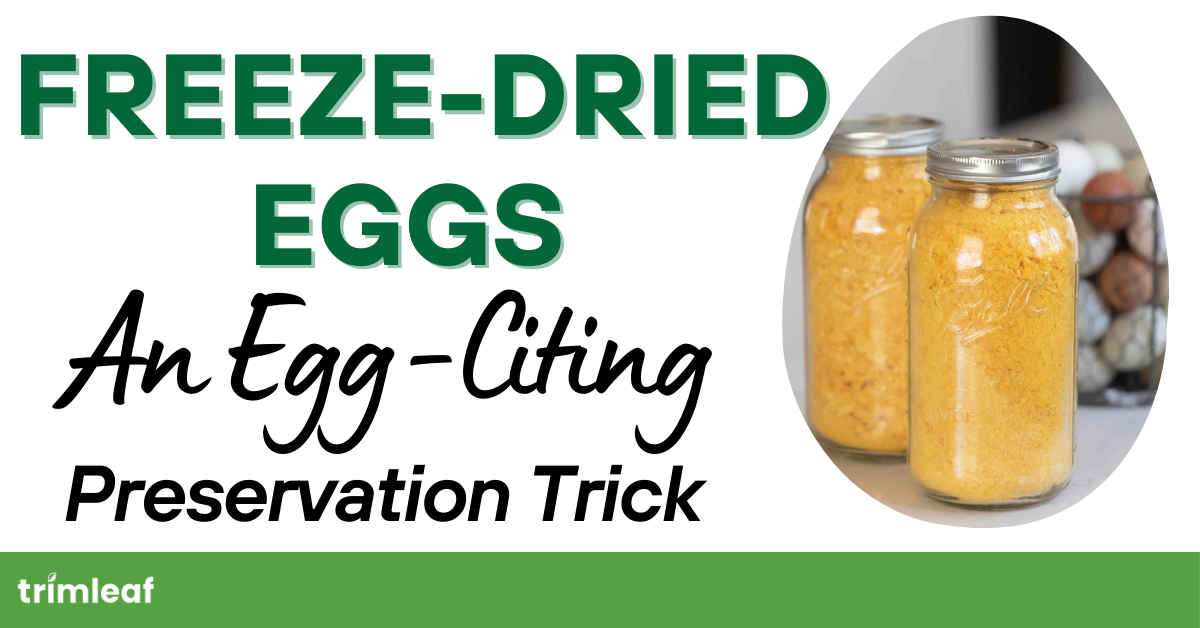
Freeze-drying, or lyophilization, has become a game-changer in food preservation, offering a way to maintain food nutritional value, flavor, and texture for an extended period.
This method elevates food preservation quality by removing moisture through a vacuum process, which prevents the growth of bacteria and mold, significantly extending the shelf life of food items.
Freeze-drying has been the solution for anyone who wants to preserve food that goes bad quickly. This is why freeze-drying has become an ideal solution to preserve products, such as eggs.
If you’re looking to explore freeze-dried eggs, this article will guide and provide you with the things you need to know so that you can start freeze-drying eggs at home.
Table of Contents
- Why Should You Freeze-Dry Eggs?
- Traditional Egg Preservation Methods
- The Advantages of Freeze-Drying Eggs
- Disadvantages of Freeze-Dried Eggs
- Things to Note About Freeze-Dried Eggs
- Should You Freeze-Dry Raw or Cooked Eggs?
- How to Freeze-Dry Eggs
- Rehydrating and Using Freeze-Dried Eggs
- Where to Use Freeze-Dried Eggs
- Conclusion
- Frequently Asked Questions About Freeze-Dried Eggs
Why Should You Freeze-Dry Eggs?

Eggs can go bad quickly and it’s not one of those that you can easily put in the freezer, unlike poultry meat. Freeze-drying eggs provides a convenient and efficient way to preserve them, ensuring they remain safe and usable for years.
There are different ways to preserve eggs, each having benefits. To help you understand why freeze-drying stands out, let’s take a look at the more traditional methods to preserve eggs.
Traditional Egg Preservation Methods
Water-Glassing
Eggs are submerged in a water and lime solution to seal the shells and prevent air from entering. This lets eggs stay fresh for up to 18 months Eggs must be unwashed and fresh and the process can be messy and requires specific storage conditions.Freezing
Eggs are cracked, beaten, and then frozen in containers or ice cube trays.They can last for about 3 months before texture changes become noticeable.They take up freezer space and require consistent freezing temperatures.Pickling
Hard-boiled eggs are submerged in a vinegar-based brine.They can last for a few months when stored in the refrigerator.Pickled eggs have a distinct taste that may not be suitable for all recipes.Dehydrating
Eggs are scrambled and cooked, then dried and ground into a powder. They can last up to a year if stored properly.Cooking alters the nutritional profile and flavor and requires careful handling to avoid contamination.The Advantages of Freeze-Drying Eggs
Freeze-drying eggs provides a superior alternative to preservation, despite limitations. Here is what you can expect when you freeze-dry eggs:
Longer shelf life, with freeze-dried eggs lasting up to 25 years.Freeze-drying retains approximately 97 percent of the nutritional value of fresh eggs.Freeze-dried eggs are lightweight and compact, taking up significantly less space and weight.Disadvantages of Freeze-Dried Eggs
While freeze-dried eggs offers many benefits, they do have some limitations, when it comes to usage.
A freeze-dried eggs can be rehydrated for scrambled eggs. You can’t get a hardboiled one with them.The texture may be a little different compared to freshly scrambled eggs. You need to properly rehydrate to get a texture close to the real thing.
Things to Note About Freeze-Dried Eggs
Like freeze-dried meat, eggs may also be freeze-dried in a raw or cooked state. However, there are some things you need to know about it before proceeding.
First, you need to beat the egg before freeze-drying. While this won’t take you to the natural look of the egg when rehydrated, beating the egg thoroughly allows you to ensure even drying. By breaking down the egg structure, you get faster and uniform drying.
Like any other freeze-dried food, don’t forget to pre-freeze them.
Should You Freeze-Dry Raw or Cooked Eggs?
There is no right or wrong answer on whether or not you should cook the egg before or after freeze-drying. It depends on the application you want to use the freeze-dried egg.
- Freeze-drying raw eggs retain the whole nutrient profile, although there is still that risk of salmonella.
- Freeze-drying cooked eggs is best when you only want the texture of scrambled eggs, such as for omelets and other related dishes.
What is critical here is that you cook the eggs properly before eating them.
How to Freeze-Dry Eggs
Freeze-drying eggs is straightforward when you have the right equipment and follow the correct steps. The easiest way to do this would be with the help of a home-freeze dryer, which would have dedicated settings for eggs.
Aside from a freeze dryer, other tools you will need are:
- Blender or Immersion Blender to evenly beat or scramble the eggs
- Trays to hold the eggs when freezing and freeze-drying
- Airtight storage containers such as Mason jars, vacuum-sealed jars, Mylar storage bags, and oxygen absorbers.
All in all, the process to freeze-dry eggs doesn’t differ much from freeze-drying other foods.
Step 1: Preparing the Eggs

Crack and scramble eggs thoroughly using a blender or immersion blender. Pre-freeze the Eggs on the Trays to prevent them from sticking. This step is important to avoid spills and to speed up the freeze-drying process.
- If you’re freeze-drying egg whites only, beat them until frothy then freeze them.
- For cooked scrambled eggs, cook them with a little butter before freezing them.
Step 2: Freeze-Drying the Eggs

Pre-cool the freeze dryer to the appropriate temperature before loading the frozen eggs. Load the pre-frozen eggs into the freeze-dryer and run the freeze-dryer according to the predetermined setting by your manufacturer.
Freeze-drying eggs can take between 16 - 24 hours, depending on the quantity and quality of the eggs. To know if they are done, they should have a powder consistency and should not feel moist and cold.
Step 3: Storing the Freeze-Dried Eggs

Proper storage is essential to maintain the quality and longevity of freeze-dried eggs. The most essential thing to remember is that freeze-dried eggs should be placed in airtight containers.
- You can use mason jars or vacuum-sealed jars.
- Mylar bags will also work, provided you vacuum seal them and add oxygen absorbers inside the bag.
On top of that, you also need to store the jars or bags in a cool and dry place, away from sunlight to prevent degradation of the freeze-dried eggs.
Rehydrating and Using Freeze-Dried Eggs

Freeze-dried eggs offer incredible convenience and long shelf life, but knowing how to rehydrate and use them effectively helps maximize the potential of this preservation method.
The basic ratio for rehydrating freeze-dried eggs is to use two tablespoons of egg powder to get the equivalent of one egg. Then add two tablespoons of cold water and mix thoroughly. Let it stand for two minutes to allow the water to be fully absorbed by the rehydrated egg.
- When raw freeze-egg is reconstituted, it must have a smooth and liquid consistency.
- For freeze-dried scrambled eggs, you will need to fry them a little to bring them back to their original form.
Where to Use Freeze-Dried Eggs
Freeze-dried eggs aren’t just good for scrambled eggs or omelets. There are other applications for them.
- Instant egg wash for baking and breading.
- Use for baking bread and cakes.
- If you love carbonara, try using freeze-dried eggs to get that creamy consistency.
The possibilities are endless! Experiment with different recipes and cooking methods to discover your favorite ways to enjoy freeze-dried eggs.
Conclusion
Freeze-drying eggs offer a unique combination of long shelf life, nutritional preservation, and versatility in culinary uses. This method stands out compared to other preservation techniques like water-glassing or freezing due to its ability to maintain the eggs' quality and versatility.
Experimenting with freeze-dried eggs can open up a range of possibilities, from creating convenient meals to mixing them into various recipes, and even having an instant snack in a matter of minutes.
Ready to start your freeze-drying journey? Check these out:
- Is Freeze-Dried Food Healthy?
- How to Freeze Dry Food At Home
- Starting a Freeze-Drying Food Business? Here's What You Need to Know
- How Does Freeze Drying Work?
- DIY Freeze-Dryer: What You Need to Know
- Freeze Dryer Maintenance and Care: FAQs, Cleaning Tips, and Troubleshooting Guide
Frequently Asked Questions About Freeze-Dried Eggs
- Why is freeze-drying an ideal method for preserving eggs?
- Eggs spoil quickly. Freeze-drying maintains their nutritional value, flavor, and texture for years, making them convenient to store.
- How does freeze-drying compare to other egg preservation methods like water-glassing, freezing, pickling, and dehydrating?
- Freeze-drying surpasses other methods by offering longer shelf life, better nutrient retention, and a lighter, more compact product.
- What are the main advantages of freeze-dried eggs?
- Longer shelf life (up to 25 years), high nutrient retention, lightweight, and compact storage.
- What are the disadvantages of freeze-dried eggs?
- Rehydrated texture might differ from fresh eggs, and they cannot be rehydrated for hard-boiled eggs.
- Can I freeze-dry raw or cooked eggs?
- Both are possible, but raw eggs retain more nutrients while cooked eggs are better for specific textures like scrambled eggs.
- What equipment do I need to freeze-dry eggs at home?
- A home freeze dryer, blender, trays, and airtight storage containers.
- What is the typical freeze-drying time for eggs?
- Around 16-24 hours, depending on the quantity and quality of the eggs.
- Can I substitute freeze-dried eggs for fresh eggs in all recipes?
- While they can be used in many recipes, some might require adjustments due to texture differences.




